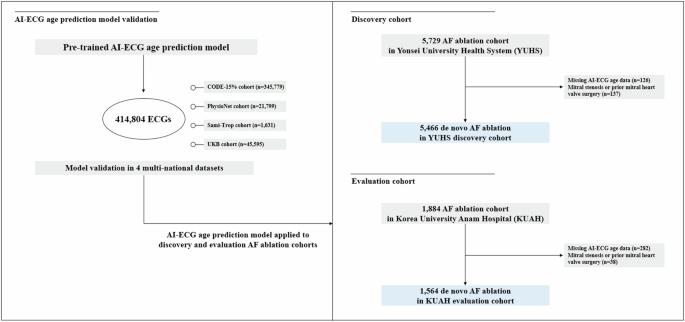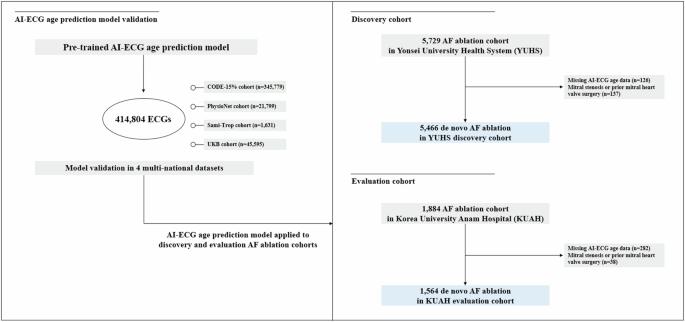Artificial intelligence estimated electrocardiographic age as a recurrence predictor after atrial fibrillation catheter ablation
IF 12.4
1区 医学
Q1 HEALTH CARE SCIENCES & SERVICES
引用次数: 0
Abstract
The application of artificial intelligence (AI) algorithms to 12-lead electrocardiogram (ECG) provides promising age prediction models. We explored whether the gap between the pre-procedural AI-ECG age and chronological age can predict atrial fibrillation (AF) recurrence after catheter ablation. We validated a pre-trained residual network-based model for age prediction on four multinational datasets. Then we estimated AI-ECG age using a pre-procedural sinus rhythm ECG among individuals on anti-arrhythmic drugs who underwent de-novo AF catheter ablation from two independent AF ablation cohorts. We categorized the AI-ECG age gap based on the mean absolute error of the AI-ECG age gap obtained from four model validation datasets; aged-ECG (≥10 years) and normal ECG age (<10 years) groups. In the two AF ablation cohorts, aged-ECG was associated with a significantly increased risk of AF recurrence compared to the normal ECG age group. These associations were independent of chronological age or left atrial diameter. In summary, a pre-procedural AI-ECG age has a prognostic value for AF recurrence after catheter ablation.


人工智能估计心电图年龄作为心房颤动导管消融术后的复发预测指标
人工智能(AI)算法在 12 导联心电图(ECG)中的应用提供了前景广阔的年龄预测模型。我们探讨了手术前人工智能心电图年龄与实际年龄之间的差距是否能预测导管消融术后心房颤动(房颤)的复发。我们在四个跨国数据集上验证了基于预训练残差网络的年龄预测模型。然后,我们使用两个独立房颤消融队列中服用抗心律失常药物并接受了去复发性房颤导管消融术的患者的术前窦性心律心电图来估算AI-ECG年龄。我们根据从四个模型验证数据集获得的 AI-ECG 年龄差距的平均绝对误差对 AI-ECG 年龄差距进行了分类;年龄-ECG(≥10 岁)组和正常 ECG 年龄(<10 岁)组。在两个房颤消融队列中,与正常心电图年龄组相比,高龄心电图与房颤复发风险显著增加有关。这些关联与年龄或左心房直径无关。总之,导管消融术前的 AI-ECG 年龄对导管消融术后房颤复发具有预后价值。
本文章由计算机程序翻译,如有差异,请以英文原文为准。
求助全文
约1分钟内获得全文
求助全文
来源期刊

NPJ Digital Medicine
Multiple-
CiteScore
25.10
自引率
3.30%
发文量
170
审稿时长
15 weeks
期刊介绍:
npj Digital Medicine is an online open-access journal that focuses on publishing peer-reviewed research in the field of digital medicine. The journal covers various aspects of digital medicine, including the application and implementation of digital and mobile technologies in clinical settings, virtual healthcare, and the use of artificial intelligence and informatics.
The primary goal of the journal is to support innovation and the advancement of healthcare through the integration of new digital and mobile technologies. When determining if a manuscript is suitable for publication, the journal considers four important criteria: novelty, clinical relevance, scientific rigor, and digital innovation.
 求助内容:
求助内容: 应助结果提醒方式:
应助结果提醒方式:


